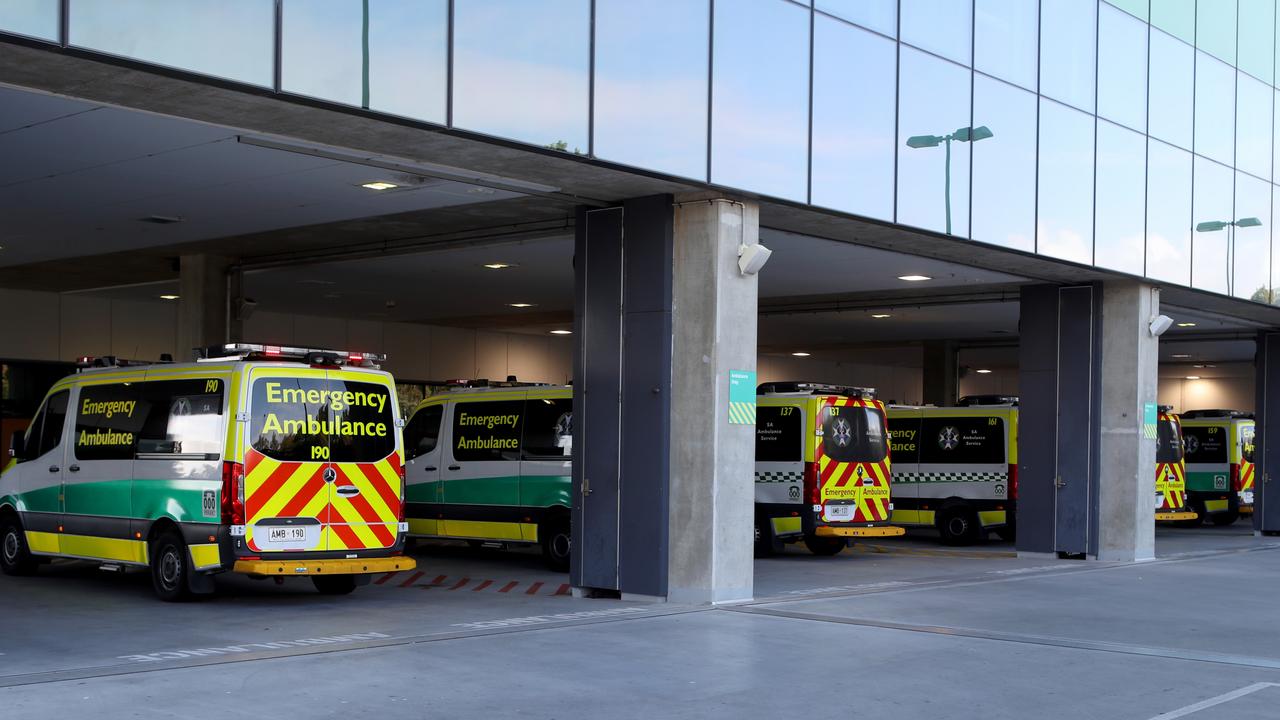Indefinite pause on elective operations as health system in unprecedented crisis
Surgeries with the potential to detect cancer are among those facing cancellation for at least a week as South Australia’s health crisis reaches unprecedented levels.
Surgeries with the potential to detect cancer are among those facing cancellation for at least a week at every hospital in the state as South Australia’s health crisis reaches unprecedented levels.
SA Health chief executive Robyn Lawrence confirmed surgeries facing an indefinite “pause” range from joint replacements to colonoscopies – vital to detect cancer, “so we are able to allocate our staff to the patients who need that care most critically”.
Opposition Leader David Speirs warned the system was “a complete disaster” with emergency departments chronically overloaded, ambulances ramped and elective surgery cancelled.
“Delays to any cancer-screening methods including colonoscopies will inevitably lead to delays in diagnosis, which could prove to be heart-wrenchingly fatal to some patients, and this is unacceptable,” he said.

On Friday morning, 21,124 patients were listed as ready for elective surgery, with 4091 overdue and 76 listed as postponed. Another 20 were postponed during Friday and this figure is set to balloon.
The “pause” on most elective surgery will be for at least a week, as what Health Minister Chris Picton called “unprecedented pressure on the health system” leaves hospitals struggling to cope.
Patients expecting a ward bed may find themselves in corridors, disused storerooms or in holding bay cubicles.
Dr Lawrence warned: “This is the worst I have seen it in South Australia since I have been here. We will be using any space deemed safe to use as a bed space.”
Mr Picton said: “We are using every single possible bed across the system, every possible flex-space that we have in our hospitals as well.”

All metropolitan intensive care units as well as EDs have been full this week, leading to a rare statewide Code Yellow – internal emergency declaration empowering an Incident Management Team to take measures to free up capacity, including:
“PAUSING” all elective surgery except category 1 and pediatric category 2. This will be reviewed daily but Dr Lawrence said he expects it to be in place for at least a week and longer if necessary.
SHIFTING regionally based patients in city hospitals to country hospitals nearer to their homes to recuperate, by ambulances and the Royal Flying Doctor Service.
MOVING child patients from Lyell McEwin and Flinders Medical Centre to the Women’s and Children’s Hospital. These are likely to be ED arrivals who will be transferred to the WCH for admission but may be extended to children already in ward beds.
USING telehealth and hospital-at-home services to try to keep patients out of hospital beds.
Officials partly blame the crisis on a surge of respiratory illnesses, including Covid which in the past week continued a two-month long spike with 2394 new cases compared to 1907 the previous week.
Dr Lawrence noted as well as 140 patients in hospital with Covid, hospitals report 270 staff off sick with the disease.

Despite billions of dollars ploughed into the health budget and numerous reforms over decades to “fix” the system, ranging from the Generational Health Review to Transforming Health, beleaguered EDs in major hospitals continue to operate well beyond capacity.
After a week where every day, all city hospitals were on Code White – EDs treating more patients than official capacity – on Friday at 7am RAH clinicians were treating 90 patients in its 69-capacity ED, and arrivals faced an average 8½-hour wait to be seen.
Clogged EDs are adding to ambulance ramping which is headed towards 100,000 hours lost under Labor.
Asked if the $2.7bn RAH was too small, Mr Picton conceded both the previous Labor and Liberal governments felt the system had too many beds but this was proved wrong by Covid, and the government is adding 150 extra beds this year. However, hospitals now are dealing with about 200 more patients a day than the same time last year.
Mr Picton cited problems getting older patients medically ready for discharge into suitable aged care homes as a factor clogging the system, saying that every day there were 150-180 such patients in hospital care who no longer need to be there.
Health Services Union state secretary Billy Elrick said the current situation was “entirely preventable” if SA Health had introduced measures to attract and retain the workforce.
“It is disgraceful that SA Health is not acknowledging the root cause of this code yellow crisis for what it is; chronic allied health staff shortages that they’ve been aware of for years,” he said.
Chief public health officer Nicola Spurrier noted factors driving the demand included a surge in respiratory illnesses including flu, Covid, RSV, whooping cough, mycoplasma and the common cold.
The flu vaccination rate stands at just 56 per cent in the vulnerable over 65 age group, and just 14 per cent in the six-month to five-year group.
She said that after the emergency Covid period marked by hand washing, social distancing and masks, when diseases such as flu plummeted to historic lows, there was now “immune naivety” in the community so people who do pick up such diseases tend to get them more severely.
Professor Spurrier urged people to return to hand washing to wear masks if ill, stay home if ill, and get the flu vaccine.






